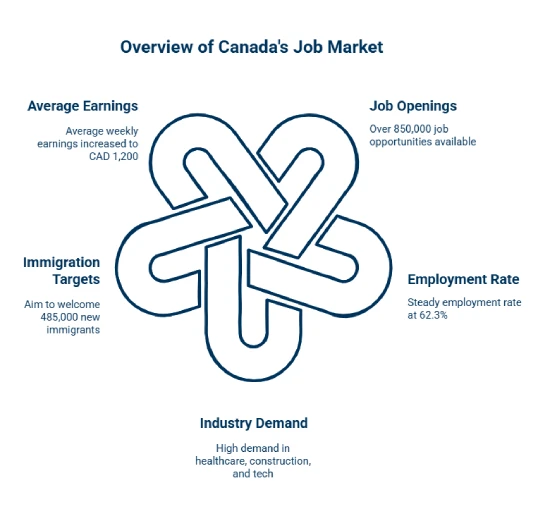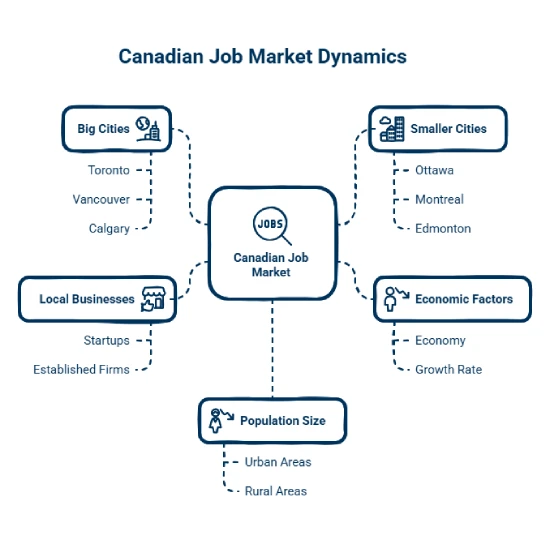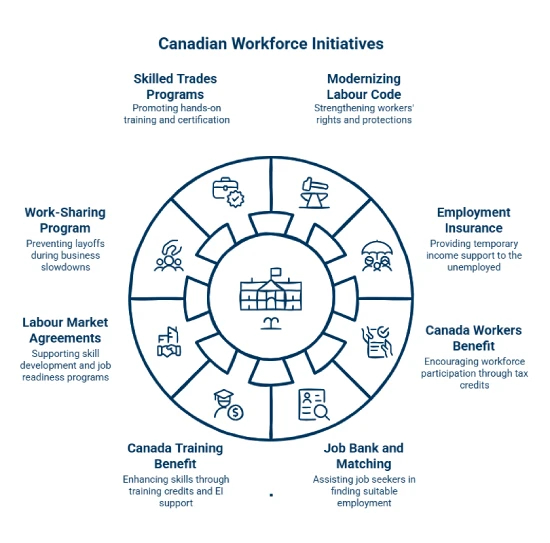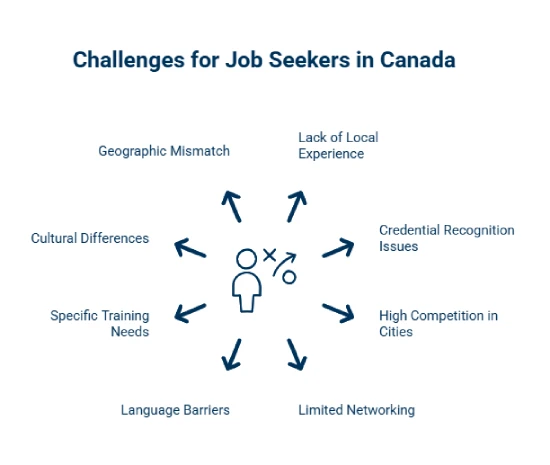Job Market in Canada 2025-26
- Canada had more than 850,000 job openings
- The employment rate is sitting at 62.3%, which shows the job market is steady.
- The healthcare, construction, and tech industries are seeing the biggest demand for workers.
- Canada aims to bring in 485,000 new immigrants in 2025
- Average weekly earnings have increased to CAD 1,200

Canada Job Outlook
Canada's job market is strong and adaptable, thanks to population growth, changing economic conditions, and focused immigration efforts. There is a growing need for skilled workers in areas like healthcare, IT, construction, and green energy. Government actions, like raising immigration targets and putting money into infrastructure and housing, are shaping what employers need. Additionally, the rise of digital tech and the shift to remote work have created new job options. With an aging population and worker shortages in various areas, Canada is an attractive place for job seekers, both from here and abroad.
Here are some key factors shaping the Canadian job market:
- Immigration policies and skilled worker intake
- Technological changes and automation
- Worker shortages in certain regions are due to an aging workforce
- Investments in infrastructure and the green economy
- Trends in remote and hybrid work
*Want to work in Canada? Let Y-Axis guide you with the process.
In-Demand Jobs in Canada
Canada is dealing with a major labour shortage, with more than 850,000 job openings reported in early 2025. Many of these jobs are in healthcare, technology, construction, and skilled trades. Employers are looking for workers both at home and from abroad to help fill these gaps.
|
Occupations |
Salary |
|
Engineering |
$125,541 |
|
IT |
$101,688 |
|
Marketing & Sales |
$92,829 |
|
HR |
$65,386 |
|
Healthcare |
$126,495 |
|
Teachers |
$48,750 |
|
Accountants |
$65,386 |
|
Hospitality |
$58,221 |
|
Nursing |
$71,894 |
Read more…
Top in-demand occupations in Canada
Workforce requirements in different Canadian cities
The job market in Canada changes from one province and city to another, depending on factors like the economy, local businesses, and how many people live there. Big cities like Toronto, Vancouver, and Calgary offer the most job opportunities. However, smaller cities are also growing, with better opportunities and roles.

The table below has the list of the top 10 cities in Canada, along with the average salary offered and the employment growth rate:
|
City |
Average Annual Salary (CAD) |
Employment Growth Rate (%) |
|
Toronto, ON |
72,000 |
3.50% |
|
Vancouver, BC |
70,000 |
3.20% |
|
Calgary, AB |
75,000 |
3.40% |
|
Ottawa, ON |
73,000 |
2.90% |
|
Montreal, QC |
68,000 |
2.70% |
|
Edmonton, AB |
71,000 |
2.80% |
|
Halifax, NS |
65,000 |
3.10% |
|
Saskatoon, SK |
66,000 |
3.00% |
|
Winnipeg, MB |
64,000 |
2.60% |
|
Kitchener-Waterloo, ON |
69,000 |
3.30% |
In-demand skills in Canada
Canada's job market is changing and now values both technical skills and soft skills. As industries focus on digital growth, sustainability, and staying competitive worldwide, employers want workers who have the latest skills.
Here's a table with the in-demand skills that can help you fit into the Canadian job market:
|
Technology Skills |
Marketing Skills |
Finance & Accounting Skills |
Healthcare Skills |
Leadership & Communication Skills |
|
Cloud Computing (AWS, Azure) |
Digital Campaign Management |
Financial Reporting |
Patient Care & Nursing Procedures |
Strategic Decision-Making |
|
Cybersecurity |
SEO/SEM Optimization |
Budgeting & Forecasting |
Electronic Health Records (EHR) |
Team Leadership |
|
Data Analytics & Power BI |
Social Media Analytics |
Taxation & Compliance |
Diagnostic & Lab Testing Skills |
Verbal & Written Communication |
|
Software Development (Java, Python) |
Brand Management |
Risk Management |
Emergency Care & Response |
Conflict Resolution |
|
DevOps & Agile Methodologies |
CRM Tools (HubSpot, Salesforce) |
Auditing & Internal Controls |
Medical Administration |
Cross-Cultural Communication |
Remote work in Canada
Remote work has really changed the job situation in Canada. Around 20% of Canadians are working from home, a big jump from the 4% we saw before the pandemic. Jobs in sectors like IT, finance, education, and marketing have picked up on this trend the most. In big cities like Toronto, Vancouver, and Montreal, people are leaning towards hybrid and remote work, and many companies are adjusting how they operate to make this possible.
The Canadian government and provincial labour departments have stepped in to make sure remote workers are protected, focusing on fair pay, better work-life balance, and online safety. Job ads featuring remote positions have gone up by 28% compared to last year, showing that employers are tuning in to what candidates want. For those looking for flexible work options and a chance to tap into job markets at home and abroad, Canada is a top spot for remote work opportunities.
*Want to migrate to Canada? Sign up with Y-Axis for complete immigration assistance!
Canadian Government Policies & Initiatives
The Government of Canada has rolled out several policies and programs to help boost workforce participation and improve job conditions for both workers and employers. The goal is to create fair workplaces, ensure decent wages, keep workers safe, and offer training and career growth, especially as jobs change with new technologies and trends.
Here are some key initiatives for employees in Canada:
- Modernizing the Canada Labour Code: This update strengthens workers' rights in areas like work hours, leave, pay fairness, and protection against harassment.
- Employment Insurance (EI) Program: This program gives temporary income support to those who are unemployed but actively looking for work or upgrading their skills.
- Canada Workers Benefit (CWB): A tax credit designed to help low-income workers and encourage them to join the workforce.
- Job Bank and Job Matching Tools: Government-funded services that assist Canadians in finding jobs that match their skills and location.
- Canada Training Benefit: This includes a training credit and support through EI to help workers enhance their skills.
- Labour Market Development Agreements (LMDAs): Federal support for provinces and territories to fund programs that focus on skill development and job readiness.
- Work-Sharing Program: A temporary support system for workers facing reduced hours during business slowdowns, helping to prevent layoffs.
- Skilled Trades and Apprenticeship Programs: These programs encourage hands-on training and certification in trades that are in demand, along with incentives for both employers and apprentices.

Employee Benefits in Canada
Canada offers employee benefits that look after the workers’ health, financial stability, and general well-being, helping them maintain a good quality of work-life across the country.
Here are some of the key employee benefits in Canada:
- Access to universal healthcare (through provincial systems)
- Paid vacation leave (at least 2 weeks a year, with more time off as you work longer)
- Parental and maternity leave (up to 18 months total leave with support from Employment Insurance)
- Employment Insurance for job loss, illness, maternity, or caregiver leave
- Pension contributions through the Canada Pension Plan
- Safety protections at work through provincial Workers’ Compensation Boards
- Minimum wage laws (varies by province and gets updated regularly)
- Overtime pay for hours worked over a standard full-time schedule
- Paid time off for public holidays
- Health and dental insurance provided by employers (common for full-time jobs)
- More flexible work options, especially since the pandemic
- Training and development programs offered by public and private organizations
Job Opportunities in Canada: Challenges for Job Seekers
Canada's job market has plenty of opportunities in areas like healthcare, IT, finance, and skilled trades. But job seekers, especially newcomers and recent grads, might face some bumps on their path to finding work. Knowing these challenges can help in getting ready and improving chances of getting hired.
Here are some common hurdles job seekers run into in Canada:
- Lack of Canadian work experience: Many employers want candidates with local experience, making it tricky for newcomers to snag their first job.
- Credential recognition issues: Qualifications from other countries often need to be checked or updated to fit Canadian standards.
- High competition in big cities: Places like Toronto, Vancouver, and Montreal attract a ton of applicants, making the job market pretty crowded.
- Limited networking opportunities: Without connections in Canada, job seekers might not hear about job openings that aren’t advertised.
- Language barriers: For jobs that require strong English or French skills, not being fluent can be a problem.
- Need for specific training or certifications: Some fields require certifications that might be unique to Canada (like Red Seal or CPA).
- Cultural differences in work norms: Getting used to Canadian work culture and job application processes can take some time.
- Geographic mismatch: In-demand jobs may be in areas with high living costs or not much housing available.

How to Navigate the Canadian Job Market Successfully?
Canada has a lively job market with many opportunities in different fields. For newcomers, finding a job takes some prep, flexibility, and knowing what the local hiring scene looks like. By following some smart steps, job seekers can improve their chances and fit into the Canadian workforce more easily.
Here are some of the tips you can follow if you plan on working in Canada:
- Make Your Resume and Cover Letter Specific: Change your resume and cover letter for each job you apply for, matching your skills and experience to what the employer is looking for.
- Grow Your Network: Go to job fairs, industry events, and use sites like LinkedIn to meet people in your area of work.
- Get Some Canadian Work Experience: Look for internships, volunteering, or part-time jobs to build local experience and get some references.
- Check Your Credentials: Get your international qualifications assessed by recognized Canadian organizations like WES or local regulatory bodies.
- Take Advantage of Resources: Use free job support services, settlement agencies, and language training programs available for newcomers.
*Finding it difficult to keep your resume up-to-date? Avail Y-Axis Resume Writing Services to get personalized assistance!
Canadian Job Market Summary
Canada's job market is holding strong with steady growth in different areas. The unemployment rate is pretty low at around 6.1%, making it a great spot for skilled workers, particularly in healthcare, tech, construction, and finance. Statistics Canada reports that there are more than 700,000 job openings across the country, showing a solid demand from employers.
Immigration is a big part of building the workforce, with over 60% of new permanent residents coming through economic immigration programs. Cities like Toronto, Vancouver, Calgary, and Ottawa have good job rates and decent pay, while remote and rural areas are seeing more openings in education, trades, and healthcare.
*Are you looking for step-by-step assistance with Canada Immigration? Contact Y-Axis, the leading visa and immigration consultancy in Canada!
Looking for Inspiration
Explore what Global Citizens have to say about Y-Axis in shaping their future
Frequently Asked Questions
